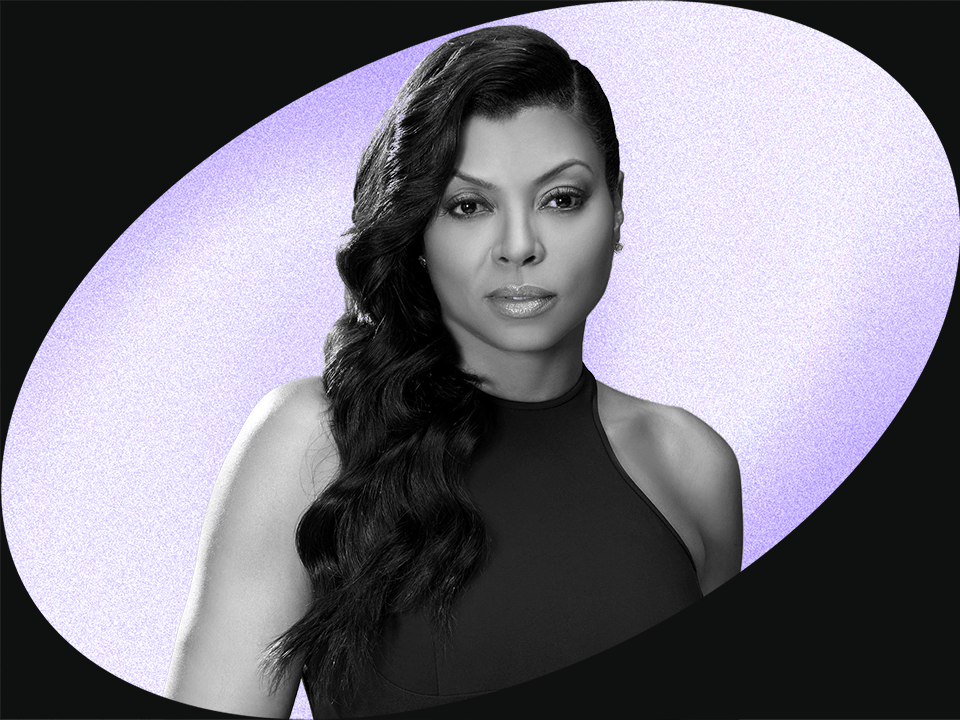Taraji P. Henson Wants You to Fight for Yourself
“It's a choice we have to make every day.”
We proudly stand with the WGA and SAG-AFTRA. As such, this interview does not focus on the promotion of any particular project.
For actor Taraji P. Henson, mental health advocacy is nothing new. She’s used her platform to talk about her experiences with anxiety, depression, and suicidal ideation and has become an influential voice in promoting mental health within the Black community.
Henson founded the Boris Lawrence Henson Foundation (BLHF) to help the Black community access culturally competent therapists and programs; spoke to congress about mental health disparities; and launched a Facebook Watch show (Peace of Mind with Taraji) highlighting first-person stories from Black folks dealing with PTSD, grief, ADHD, bullying, and more. (The Why Black Men Don’t Cry episode with Chance the Rapper is a must watch for sure.)
This fall, Henson’s organization is continuing that community work by teaming up with kate spade new york to bring free access to quiet spaces, yoga, and therapy to Hampton University. This is the second HBCU getting these no-cost services, and Henson tells Wondermind that she hopes to expand her reach to global BIPOC communities where mental health help is stigmatized. “We look to find ways of meeting people where they are, honoring cultural traditions, [and] uncovering healing practices that already exist,” she says.
We caught up with her at kate spade new york’s Global Summit on Women’s Mental Health and Empowerment to chat more about the program coming to Hampton University, how she’s staying present, and what it means to choose herself each day.
[Sign up here to never miss these candid conversations delivered straight to your inbox.]
WM: What do you do for your mental health every day?
Taraji P. Henson: Oof. For my mental health, what I do every day is I breathe. Intentional breathing. When I feel like anxiety is about to overtake me, I just stop, ground myself, and I breathe. Breathing is a great exercise, and we don’t use it enough [laughs]. [I do a lot of] deep breathing, being aware of my breath instead of just breathing. I intentionally [take a] deep inhale and I do a long exhale, and it centers me.
WM: What do you do for yourself when you're having a bad mental health day aside from deep breathing?
TPH: That’s a day I usually take to myself. If there are meetings I can move around or postpone for another day, I try to do that. I try to give myself the space that I need to work out whatever I may be going through.
WM: When was the last time you took a mental health day?
TPH: I would say I did it on my birthday. Someone wanted to take me out and I was like: You know what? I just want to lay in bed. And it wasn't that I was sad or depressed or anything. That's just what I wanted to do and I'm glad I did it.
WM: It’s so cool that, this fall, students at Hampton University are getting things like free therapy and yoga classes thanks to your organization and kate spade new york. What would resources like this have done for you in college?
TPH: I became a mother in my junior year, and I'm just grateful that I had the amazing support of my family, but there were students that didn't. You know [when] you want to help someone but you don’t quite know how? We weren’t even talking about mental wellness at the time. It wasn't even a conversation we were having in the community, let alone at school. And I just think about how many of my friends that did not graduate or dropped out for whatever reasons may have stayed if they had a mental wellness [space] to go to. [This space would have been great for] certain students I knew were suffering and [for me on] days when I just didn't feel like myself. You're at college, you're on campus, you're around students all the time. You have roommates. When you're far away from your home and everything that you know, when do you really have that moment—where can you go—to really center yourself or to just disconnect, decompress?
WM: If students walk away with one lesson from this program, what do you hope that lesson is?
TPH: That it's OK to take moments in life to take care of yourself. This is not about grinding. Grinding can kill you. It’s not healthy.
WM: What was it like for you to talk about your own mental health struggles for the first time publicly?
TPH: It was very scary, but [that’s where] real change happens. Things that you are fearful of, you have it in you to overcome those fears because when you overcome them, you're helping someone else. So I knew the importance of me speaking out about my struggles because of who I am. Sometimes people think celebrities, we got it easy because we have money, but money adds to your problems [laughs]. [But] it was easier [talking publicly] because of the support I had from my loved ones.
WM: You’ve also been super open about going to therapy. What has that journey been like for you?
TPH: I went once [in my] late 30s. Didn't really have a real connection because I hadn't really gotten to the place of understanding where I was in my mental health journey, but then I would say my middle 40s is when I got serious [about therapy].
It’s up and down. It's like looking for a relationship. I had a therapist and she was really great for that portion of my healing, but now I'm in a different place, so now I'm yet again in search for another therapist. I'm not going to give up on searching for that therapist because I'm never going to give up on me. It's just like any relationship. You have to cultivate it. You have to work on it. Some therapists work, some don't. So you just got to keep [going]. You don't give up on looking for that significant other [laughs]!
WM: What’s the best thing that you’ve learned in therapy so far?
TPH: The one thing that she brought to my attention that I still do [sometimes] but I've gotten better at is writing scripts before something happens. I have already written the beginning, the middle, and the end. I've written the entire script, and, a lot of times, my script is wrong. But she taught me how to get out of my head and stay grounded in reality of what's going on and stop living beyond the moment. Staying in the moment. It's work. It's still work. I'm always the person trying to get to the other side, [but] you just have to take your time and you have to be patient.
I'll write the script in my head [about] a breakup or a relationship without letting it unfold. You know what I mean? So I'm already making up what's going to happen before it even happens. That’s a lot of work. That adds to my anxiety. Literally, when I feel myself starting to write the script, I go, Put the pen down, breathe. Nothing has happened yet. You have to wait until it unfolds. I'm so busy trying to write the ending.
You can’t get over it. You can’t go under it. You got to go through it.
WM: What advice do you have for people who are nervous to start therapy for the first time?
TPH: Start online! Do a session in your own house via Zoom that way you're comfortable. You're in your own home. No one saw you go into the office. [You don’t have to worry about,]What are they going to say about me? Try it out at home first.
WM: Your foundation, the Boris Lawrence Henson Foundation, is named after your late father. What do you think he would be most proud of that you’ve accomplished in the mental health space so far?
TPH: I just think the lives that I’m touching and changing, hopefully for the better, and saving. So, yeah, I know he’s proud.
WM: What do you think he would be most proud of that you’ve accomplished working on your own mental health?
TPH: Talking about it. Being as open as I am about it. I think he would be very proud of that. Because that’s healing.
WM: A lot of people might be hesitant to tell loved ones that they’re struggling. Do you have any advice for them?
TPH: Sometimes if you can't put it in words [verbally], write it down or send an email to break the ice. Send a text. Sometimes it's hard for people to say it, so write it.
WM: Love that. What’s the best mental health advice, in your opinion, that you've ever given someone?
TPH: Fight for yourself. Fight for you. Like I say, most people fight harder for a significant other than they will for themselves. Fight for yourself.
WM: When was a time that you had to fight for yourself?
TPH: Every day, you know? We have to choose, every day we wake up, what side we're going to be on today. Am I light or dark? Love or hate? It's a choice we have to make every day.
This interview has been edited and condensed for length and clarity.
Wondermind does not provide medical advice, diagnosis, or treatment. Any information published on this website or by this brand is not intended as a replacement for medical advice. Always consult a qualified health or mental health professional with any questions or concerns about your mental health.




